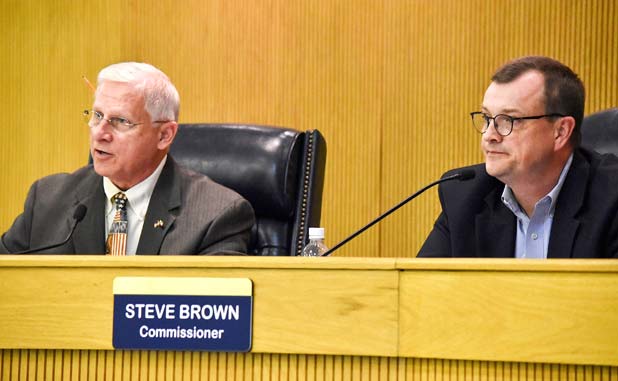The Fayette County Board of Commissioners approved a settlement plan for the district voting lawsuit just before midnight at the end of the Jan. 14 regular meeting.
The vote was 3-2, with Chairman Charles Oddo along with commissioners David Barlow and Charles Rousseau voting in favor. Commissioners Steve Brown and Randy Ognio voted against the plan.
A previous motion to reject the settlement proposal failed along the same voting lines.
The action came after a lengthy executive session and less than 10 minutes before midnight. More than a dozen people were still in the audience at that late hour, after a large crowd attended the meeting, many no doubt to see what if any action would be taken on this issue.
A separate vote was taken to move forward with the necessary legislative action to approve the new district maps, and that vote was also approved 3-2.
The bulk of the resolution was then read into the record and some commissioners made their own statements before adjournment.
Now the issue moves to the General Assembly, where officials hope the necessary local legislation can move through both houses in time to make everything official before qualifying, which begins March 7.
Before the vote and discussion, county attorney Dennis Davenport read a large portion of the proposed settlement agreement into the record word for word to avoid any misunderstanding over the terms.
The county agreed to submit to its legislative delegation a map with four single-member districts, for which a commissioner must live in and be elected only by voters from his or her district, as well as one at-large district to be elected by the entire county. Once that is approved, the county would pay no more than $125,000 to settle all claims for attorneys’ fees and other costs.
The settlement explicitly states that there is no admission of liability or wrongdoing by either party, and that it is a compromise intended to prevent any further litigation.
A key item with which some commissioners were more than a little displeased is the following statement: “Plaintiffs acknowledge that there was no intentional racial discrimination in the county’s use of and defense of its at-large districting system.” A few members of the board wanted the word “intentional” removed from that statement, but it remained.
After Davenport presented the proposal, Ognio moved immediately to reject it and Brown seconded that motion.
“I’m sticking by my campaign promise,” said Ognio. “I don’t see how we, when three of us were elected at-large, can vote to take away three-fifths of the citizens’ voting rights. We are here to represent the citizens.”
Ognio pressed for every voter’s right to elect the entire Board of Commissioners, calling it “a right worth protecting.”
“I’m sure how you can put a cost on that right. Giving up now is like throwing all of that money away,” he said. “There is no guarantee how it would turn out but at least we would have our day in court.”
Ognio objected strongly to the use of the word “intentional” regarding discrimination. “How can this board vote for a settlement that says there was discrimination, intentional or not?” he asked.
He concluded his remarks by advising the voters that they “should ask if their representatives are doing what they were elected to do. If not, the election is right around the corner.”
The outcome of this first vote was made clear when Barlow asked for clarification about the need for a separate vote to accept the settlement should this one fail. He then said he would reserve his comments for that time, indicating that all five already knew the motion to reject the settlement would fail. It did, by a 3-2 vote.
Rousseau then moved to accept the settlement and Barlow seconded. Barlow then read from a prepared statement in which he noted that all parties involved were citizens of Fayette County.
“To go against the judge was not a gamble I was willing to make with the citizens’ money,” he said, referencing the recent mediation ordered by the judge and his prior rulings. “I really believe it was in the best interest of our county to come to a settlement.”
Barlow pointed out that both sides had to compromise to reach the agreement that was now before them. “Working together to peacefully solve a problem is good for the health and well-being of this county,” he said, adding that continuing to pursue the lawsuit and coming up short would be a loss for taxpayers.
“Many of my constituents did not know what the lawsuit was about, but when they heard how much it cost with no guarantee of success, they were not in favor of continuing,” said Barlow. “This shows that we can work together and move forward with the important business of Fayette County.”
Brown also read a statement into the record, noting first that he was the only member of the board elected at-large and in a single district. He pointed out his public support for Ed Johnson, who recent won the mayor’s race in Fayetteville as a black Democrat defeating an incumbent Republican, and his former membership in the county’s NAACP chapter.
“The lawsuit initiated by the NAACP was predicated on a lie to begin with, that no African American had or could be elected to countywide office,” said Brown, noting former Magistrate Judge Charles Floyd who had done so.
Brown also disputed the use of the “intentional racial discrimination” phrase in the settlement, saying the suggestion of unintentional discrimination is also false, but he added that the statement itself would be “dispelling the very foundation of the plaintiff’s case.”
The fact that the NAACP would accept the settlement maps and “swallow a major portion of their legal fees” was proof that the evidence was in favor of the county, Brown said.
“When attorneys express fear of moving forward in defense of the citizens in this county not because our case lacks merit, but because of what the judge will presumably do, the system has failed us,” he said. “The mediation process was more like a sledgehammer than a thoughtful intervention. This only encourages disrespect for the rule of law.”
Brown noted that, in addition to Johnson’s recent win in a majority-white city “where streets are named after Confederate heroes,” a mayor and two council members who are white Republicans recent won election in Savannah, which is 55 percent black.
“It appears what the judge found impossible is happening all over the state,” he said, repeating the frequent argument that the Fayette lawsuit was not about race but about electing a Democrat in a heavily Republican county.
“As to why the Board of Commissioners pursued this lawsuit with a majority of citizens backing the effort, costing around 800,000 taxpayer dollars, only to drop it at the moment the trial was about to begin, I am in shock right along with you,” said Brown. “Those specific commissioners will have to explain their rationale to the voters in this 2016 election year.”
Noting that the plaintiffs “could have had a similar set of settlement districts at the onset of this lawsuit in 2012,” Brown said their “hubris” has cost much wasted money and effort.
“This is why I despise politics,” he concluded.
Rousseau did not read from a prepared statement but spoke briefly, referencing the Civil Rights Act, Voting Rights Act, Brown v. Board of Education and other landmark federal cases when pointing out the need for this decision at this time.
“I think this is the right time to end this and move forward,” he said.
Oddo began by noting how difficult the decision was for all members of the board because of their love for the county.
“I would prefer to have at-large voting,” he said. “I wish we could. I don’t think now that is the case. I’m trying to do what’s best for everybody.”
Oddo said that the judge has already ruled against Fayette County twice and seems ready to do so again. He added that the chance of winning another appeal or even being heard by the Supreme Court is unlikely, and an appeal would mean the current district-voting arrangement remains in place for 2016, 2018 and maybe 2020 while the case proceeds.
Lamenting that he does not like the loss of citizens’ right to vote and he is not pleased with gerrymandered districts, he is pleased that this agreement eliminates gerrymandering and said the current District 5 map “severely distorts three districts.”
Oddo said it was very important to him that the $125,000 cap be included, saying the county could keep going until legal fees topped $2 million and still not get the desired result. He added that it was important to keep at-large voting alive in some fashion.
“Without this agreement there would be nothing,” he said. “We preserved some of our rights and the legal fees were reduced dramatically.”
Oddo said that when looking at where the county is now and where it could be in the future, the settlement agreement was the best course of action.
After the vote to accept the settlement, Davenport pointed out that an official resolution would be required asking the legislature to redraw the map according to the terms of the settlement.
“The timing is critical,” said Davenport, adding that the earliest the legislature can be officially notified after legal requirements are met is Jan. 25, and qualifying for 2016 elections is scheduled to begin March 7.
That resolution passed 3-2 along the voting lines as the other two motions.
Below, Fayette County commissioners Randy Ognio (L) and Charles Rousseau. The two were on opposite sides of the district voting settlement. Photo/Staff.












Leave a Comment
You must be logged in to post a comment.